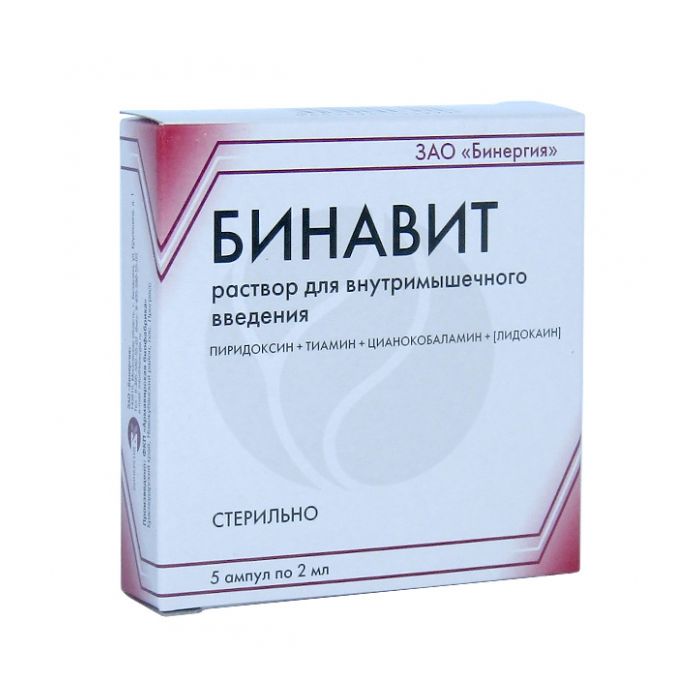Binavit solution for intramuscular injection, 2ml No. 5
Expiration Date: 11/2025
Russian Pharmacy name:
Бинавит раствор для в/м введения , 2мл №5
In the complex therapy of diseases of the nervous system of various origins:
neuritis and polyneuritis, incl. retrobulbar neuritis;
neuralgia, incl. trigeminal nerve and intercostal nerves;
peripheral paresis, incl. facial nerve;
pain syndrome (radicular, myalgia);
plexopathies, ganglionitis (including herpes zoster);
neuropathy and polyneuropathy (diabetic, alcoholic, etc.);
nocturnal muscle cramps, especially in older patients;
neurological manifestations of osteochondrosis of the spine (radiculopathy, lumboischialgia, muscle-tonic syndrome).
The drug is recommended for deep intramuscular injection. The duration of treatment is determined by the doctor individually, depending on the severity of the symptoms of the disease.
With severe pain syndrome, 2 ml (1 ampoule) daily for 5-10 days, then 2 ml (1 ampoule) 2-3 times a week for 2 weeks. For maintenance therapy, it is recommended to take oral forms of B vitamins.
pyridoxine hydrochloride 50 mg
thiamine hydrochloride 50 mg
cyanocobalamin 0.5 mg
lidocaine hydrochloride 10 mg
hypersensitivity to drug components;
acute heart failure, chronic heart failure in the stage of decompensation;
thrombosis and thromboembolism;
children under 18 years of age (efficacy and safety of use have not been established).
pharmachologic effect
Combined drug. Neurotropic B vitamins (thiamine, pyridoxine, cyanocobalamin) have a beneficial effect on inflammatory and degenerative diseases of the nerves and locomotor system. They are not used to eliminate hypovitaminosis conditions, but in high doses have analgesic properties, promote increased blood flow and normalize the functioning of the nervous system, the process of hematopoiesis (cyanocobalamin (vitamin B12)).
Vitamins thiamin (B1), pyridoxine (B6,) and cyanocobalamin (B12) regulate protein, carbohydrate and fat metabolism, contribute to their normalization, improve the function of motor, sensory and autonomic nerves.
Lidocaine is a local anesthetic.
Pharmacokinetics
After intramuscular administration, thiamineIt is rapidly absorbed from the injection site and enters the bloodstream (484 ng / ml after 15 minutes on the first day of a 50 mg dose) and is unevenly distributed in the body when its content in leukocytes is 15%, erythrocytes are 75% and blood plasma is 10%. Thiamine crosses the blood-brain and placental barriers and is found in breast milk. Thiamine is excreted by the kidneys in the alpha phase after 0.15 hours, in the beta phase after 1 hour and in the final phase within 2 days. The main metabolites are thiamincarboxylic acid, pyramine and some unknown metabolites. Of all the vitamins, thiamine is retained in the body in small amounts. The body of an adult contains about 30 mg of thiamine in the form: 80% in the form of thiamine pyrophosphate, 10% thiamine triphosphate and the rest in the form of thiamine monophosphate.
After intramuscular injection, pyridoxine is rapidly absorbed from the injection site and distributed in the body, acting as a coenzyme after phosphorylation of the CH2OH group in the 5th position. About 80% of the vitamin binds to blood plasma proteins. Pyridoxine is distributed throughout the body, crosses the placenta, and is found in breast milk. It accumulates in the liver and is oxidized to 4-pyridoxinic acid, which is excreted by the kidneys, a maximum of 2-5 hours after absorption.
Indications of the drug Binavit
In the complex therapy of diseases of the nervous system of various origins:
neuritis and polyneuritis, incl. retrobulbar neuritis;
neuralgia, incl. trigeminal nerve and intercostal nerves;
peripheral paresis, incl. facial nerve;
pain syndrome (radicular, myalgia);
plexopathies, ganglionitis (including herpes zoster);
neuropathy and polyneuropathy (diabetic, alcoholic, etc.);
nocturnal muscle cramps, especially in older patients;
neurological manifestations of osteochondrosis of the spine (radiculopathy, lumboischialgia, muscle-tonic syndrome).
Dosage regimen
The drug is recommended for deep intramuscular injection. The duration of treatment is determined by the doctor individually, depending on the severity of the symptoms of the disease.
With severe pain syndrome, 2 ml (1 ampoule) daily for 5-10 days, then 2 ml (1 ampoule) 2-3 times a week for 2 weeks. For maintenance therapy, it is recommended to take oral forms of B vitamins.
Side effect
Allergic reactions (skin reactions in the form of itching, urticaria), increased sweating, tachycardia, acne, shortness of breath, angioedema, anaphylactic shock may occur.
In cases of very rapid administration of the drug, systemic adverse reactions (dizziness, headache, arrhythmia, convulsions) may occur, they can also result from an overdose.
If any of the side effects indicated in the instructions are aggravated, or you notice any other side effects not listed in the instructions, inform your doctor.
Contraindications for use
hypersensitivity to drug components;
acute heart failure, chronic heart failure in the stage of decompensation;
thrombosis and thromboembolism;
children under 18 years of age (efficacy and safety of use have not been established).
Application during pregnancy and lactation
During pregnancy and lactation, the use of the drug is not recommended.
Application in children
Contraindicated in children under 18 years of age
Overdose
Symptoms: increased symptoms of side effects of the drug.
Treatment: symptomatic therapy.
Drug interactions
Thiamine breaks down completely in solutions containing sulfites. Other vitamins are inactivated in the presence of thiamine breakdown products. Thiamine is incompatible with oxidizing and reducing substances: mercury chloride, iodide, carbonate, acetate, tannic acid, iron-ammonium citrate, as well as phenobarbital, riboflavin, benzylpenicillin, dextrose and metabisulfite. Copper ions, pH values ??(over 3.0) accelerate the destruction of thiamine.
Pyridoxine is not prescribed simultaneously with levodopa, cyclossrine, D-penicillamine, epinephrine, norepinephrine, sulfonamides, which reduce the effect of pyridoxine.
Cyanocobalamin is incompatible with ascorbic acid, heavy metal salts.Taking into account the presence of lidocaine in the preparation, in the case of additional use of noreiinephrine and epinsphrine, side effects on the heart may increase. In case of an overdose of local anesthetics, epinephrine and norepinephrine should not be used additionally.

